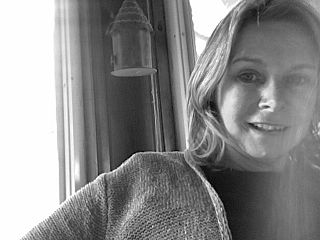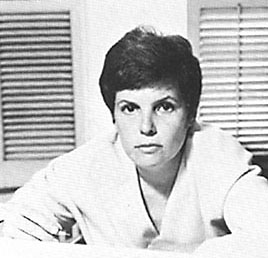A Quote by Suzanne Weyn
Even though she saw tattoos everywhere, they continued to fascinate her. How bizarre to be branded like a box of cereal. Didn't people mind being counted as just one more product on a shelf? There had to be more to a person than that.
Related Quotes
She died that night. Her last breath took her soul, I saw it in my dream. I saw her soul leave her body as she exhaled, and then she had no more needs, no more reason; she was released from her body, and being released, she continued her journey elsewhere, high in the firmament where soul material gathers and plays out all the dreams and joys of which we temporal beings can barely conceive, all the things that are beyond our comprehension, but even so, are not beyond our attainment if we choose to attain them, and believe that we truly can.
I have a friend, a pastor, who applied with me and 419 other people for 25 seats on a special advisory board. Though I believed she was infinitely more qualified than me, she wasn't selected and I was. When I saw her at her church weeks later, I asked her how she felt about the decision. While disappointment, self-doubt and defeat would have been normal reactions to the Board's decision, my friend said she felt great. 'How come?' I asked. She said with a smile, 'I just figured God had something better in store for me.'
But when did you see her, talk to me? When did you see her go into the cave? Why did you threaten to strike a spirit? You still don't understand, do you? You acknowledged her, Broud, she has beaten you. You did everything you could to her, you even cursed her. She's dead, and still she won. She was a woman, and she had more courage than you, Broud, more determination, more self-control. She was more man than you are. Ayla should have been the son of my mate.
Then she would be done with J. D. Jameson forever. No more having to prove herself; no more of those pesky jitters she felt whenever she saw him at work—something like butterflies in her stomach, it was actually quite annoying; no more stress; no more fights in the library; and definitely no more sexy I’m-gonna-kiss-you-now-woman blue-eyed heated gazes. She had no idea why she just thought that.
A work of art is something produced by a person, but is not that person — it is of her, but is not her. It’s a reach, really — the artist is trying to inhabit, temporarily, a more compact, distilled, efficient, wittier, more true-seeing, precise version of herself — one that she can’t replicate in so-called ‘real’ life, no matter how hard she tries. That’s why she writes: to try and briefly be more than she truly is.
She didn't care anymore... and she got no pleasure from the work she did, but she did it. Everything bored her. She found that when she didn't have a notebook it was hard for her to think. The thoughts came slowly, as though they had to squeeze through a tiny door to get to her, whereas when she wrote, they flowed out faster than she could put them down. She sat very stupidly with a blank mind until finall 'I feel different' came slowly to her mind. Yes, she thought, after a long pause. And then, after more time, 'Mean, I feel mean.
She stood there until something fell off the shelf inside her. Then she went inside there to see what it was. It was her image of Jody tumbled down and shattered. But looking at it she saw that it never was the flesh and blood figure of her dreams. Just something she had grabbed up to drape her dreams over.
"She (Minnie Ruth Solomon) was unusual because even though I knew her family was as poor as ours, nothing she said or did seemed touched by that. Or by prejudice. Or by anything the world said or did. It was as if she had something inside her that somehow made all that not count. I fell in love with her some the first time we ever talked, and a little bit more every time after that until I thought I couldn't love her more than I did. And when I felt that way, I asked her to marry me . . . and she said she would."
The wide world was changing, and she wanted a different place in it. Not just wanted, but felt she deserved. If the world didn't owe her a living, as her mother repeatedly warned her, it owed her a break. She had a strong sense that a better, more exciting, more rewarding life than that which had been the lot of her parents and grandparents was hers by right. In this she was guilty of nothing more serious than the arrogance of youth, from which every generation suffers and by which it distinguishes itself from the preceding one.
I saw the way she was looking at you, and I knew that she still loved you. More than that, I know she always will. It breaks my heart, but you know what? I'm still in love with her, and to me that means that I want nothing more than for her to be happy in life. I want that more than anything. It's all I've ever wanted for her.
As though she had entered a fable, as though she were no more than words crawling along a dry page, or as though she were becoming that page itself, that surface on which her story would be written and across which there blew a hot and merciless wind, turning her body to papyrus, her skin to parchment, her soul to paper.
She saw him the first day on board, and then her heart sank into her shoes as she realized at last how much she wanted him. No matter what his past was, no matter what he had done. Which was not to say that she would ever let him know, but only that he moved her chemically more than anyone she had ever met, that all other men seemed pale beside him.
She didn't like to be talked about. Equally, she didn't like not to be talked about, when the high-minded chatter rushed on as though she was not there. There was no pleasing her, in fact. She had the grace, even at eleven, to know there was no pleasing her. She thought a lot, analytically, about other people's feelings, and had only just begun to realize that this was not usual, and not reciprocated.



































